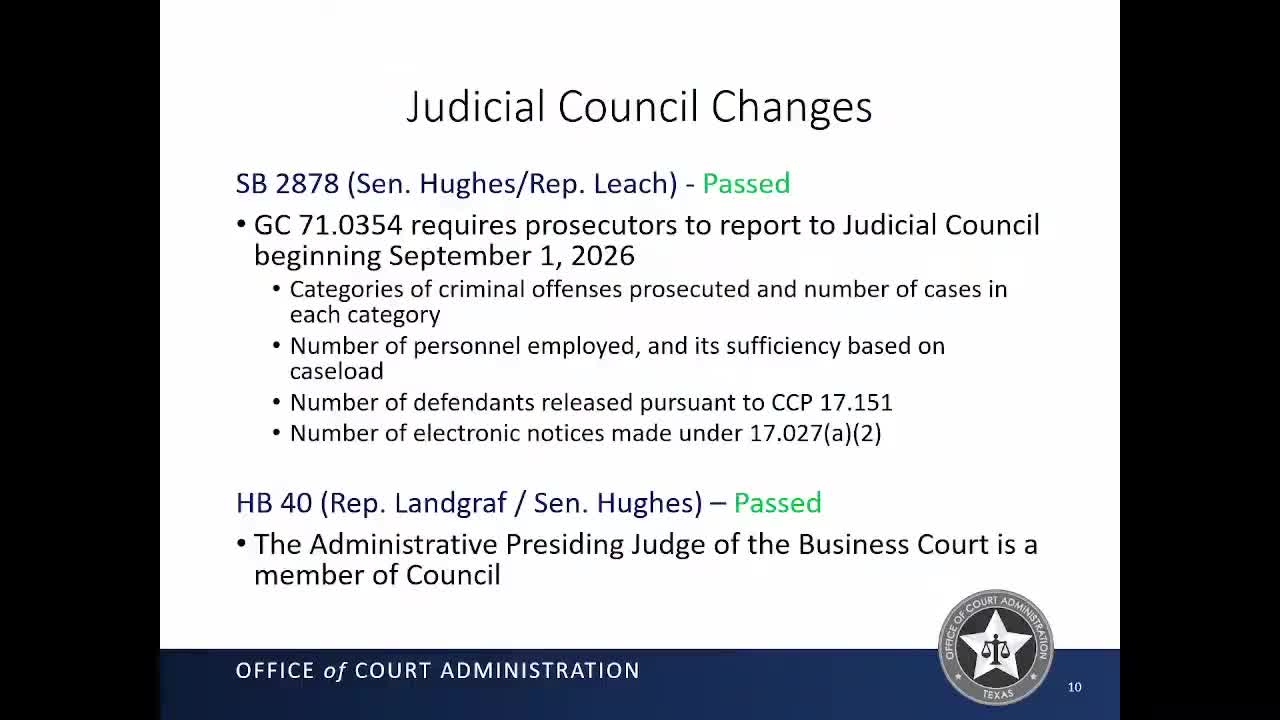Texas Senate approves court omnibus bill enhancing judicial reporting and security measures
June 14, 2025 | Court of Criminal Appeals (CCA), Judicial, Texas
This article was created by AI summarizing key points discussed. AI makes mistakes, so for full details and context, please refer to the video of the full meeting. Please report any errors so we can fix them. Report an error »

A significant shift in Texas judicial reporting is on the horizon as the Texas Judicial Council prepares to collect data from district attorneys for the first time, following the passage of Senate Bill 2878. Historically, the council has only gathered information from clerks at the district, municipal, and justice of the peace levels. This new initiative aims to enhance transparency and accountability within the judicial system, with further details expected at the next council meeting.
In addition to this major change, House Bill 40 has expanded the council's membership to include Judge Dorfman, the administrative presiding judge for the business court. His experience in implementing the business court is anticipated to bring valuable insights to the council's discussions.
The meeting also highlighted ongoing efforts to reform bail practices in Texas. The council has been advocating for changes since 2016, and recent legislation, including Senate Bill 6 and the Damon Allen Act, has focused on preventative detention and public safety reporting. Notably, Senate Bill 9 introduces new criteria for judges regarding violent crime cases, while Senate Bill 578 enhances penalties for doxing judges and court personnel.
Furthermore, the council discussed judicial profession shortages and court efficiency recommendations, which were incorporated into Senate Bill 2878. This omnibus bill addresses various issues, including increasing the years of required legal experience for associate judges and enhancing compensation for local administrative judges.
While some recommendations, particularly those related to mental health reforms and civics education, did not gain traction, the council remains committed to improving access to courts and supporting court personnel. The meeting underscored the council's proactive approach to addressing the evolving needs of Texas's judicial system, with a focus on accountability, efficiency, and public safety.
In addition to this major change, House Bill 40 has expanded the council's membership to include Judge Dorfman, the administrative presiding judge for the business court. His experience in implementing the business court is anticipated to bring valuable insights to the council's discussions.
The meeting also highlighted ongoing efforts to reform bail practices in Texas. The council has been advocating for changes since 2016, and recent legislation, including Senate Bill 6 and the Damon Allen Act, has focused on preventative detention and public safety reporting. Notably, Senate Bill 9 introduces new criteria for judges regarding violent crime cases, while Senate Bill 578 enhances penalties for doxing judges and court personnel.
Furthermore, the council discussed judicial profession shortages and court efficiency recommendations, which were incorporated into Senate Bill 2878. This omnibus bill addresses various issues, including increasing the years of required legal experience for associate judges and enhancing compensation for local administrative judges.
While some recommendations, particularly those related to mental health reforms and civics education, did not gain traction, the council remains committed to improving access to courts and supporting court personnel. The meeting underscored the council's proactive approach to addressing the evolving needs of Texas's judicial system, with a focus on accountability, efficiency, and public safety.
View full meeting
This article is based on a recent meeting—watch the full video and explore the complete transcript for deeper insights into the discussion.
View full meeting
